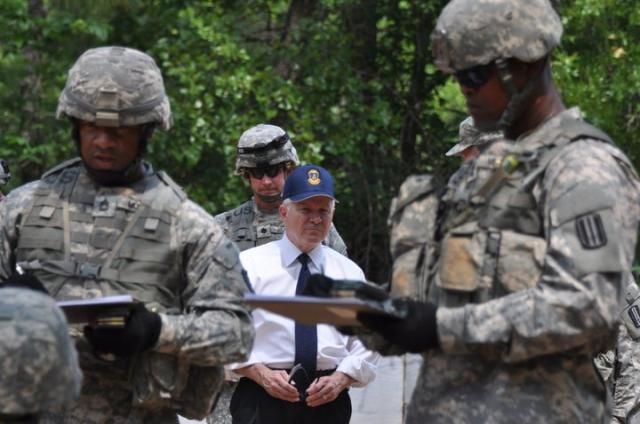Defense Secretary Robert M. Gates spoke with Marines and Soldiers and watched them train today at two East Coast military installations, thanking them for their service, and — 48 days away from his June 30 retirement — saying goodbye.
“I want to thank you for your service, for your sacrifices, for taking care of your buddies, for your victories in Anbar and Helmand and so many other places,” Gates said during a town hall with about 1,100 Marines.
Gates took questions from these Marines at Lejeune, and from Soldiers at the U.S. Army Training Center at Fort Jackson, S.C.
Topics were diverse but questions that arose most often among the troops involved the future of the military services and Defense Department budget cuts.
“Four times in the last century, after wars, we have unilaterally disarmed ourselves and then have had to discover all over again that the world isn’t a friendly place,” Gates said.
At the end of the Cold War, the secretary said, “people talked about the ‘end of history’ like everybody was going to live together in peace and harmony.”
Terrorism, problems with Iran and North Korea, China’s military program, the conflict in Libya and upheaval across the Middle East show “that the world is a very unstable place and will be so for a long time into the future,” he said.
Where the next hot spot will develop is impossible to say, he added, “but there’s no doubt in my mind about one thing, and that is [that] you will be needed and you will be deployed.”
The United States will always need its military capability to protect its interests and security, Gates said.
“One of the things I feel strongest about,” he added, is that the nation does not repeat mistakes made during budget cuts in the 1970s and 1990s that “hollowed out the force.”
Such damage, he said, comes from sustaining force structure while reducing manpower, flight-training hours, tank miles, steaming days for ships, and money for exercises and training.
“That’s how you hollow out a military,” he said.
“You have the same number of brigades or regiments but you don’t have the people to staff them and you don’t have the money to train and keep the people who are doing the job at a level of excellence that is required.”
Gates said across-the-board cuts represent managerial cowardice.
“What I intend to do is try and shape this going forward, before I get out of here,” he said, so the president and Congress understand the hard choices that need to be made.
Over the next 10 to 12 years, Gates said, his approach would include continuing the efficiencies effort begun in the Defense Department last summer and cutting marginal capabilities and missions.
A third piece — the hardest to implement, he said — involves “forcing decision makers to look at our strategy and our capabilities and [decide] where they are prepared to take risk in meeting future challenges.”
As an example he cited the Quadrennial Defense Review, in which “there are a bunch of scenarios of all the different things we should be prepared to take on in the years to come,” Gates said.
One scenario that has been included in the review over the years, he said, “is our ability to fight two major regional conflicts at the same time — let’s say, just hypothetically, Iran and North Korea. And we built the force to be able to do that.”
If the nation decides it is unnecessary to have that capability because the odds of getting into simultaneous conflicts are so low, Gates said, “what are the implications for force structure of that?”
Such a decision poses a risk, the secretary said. “The risk is that we’re wrong. And the enemy always has a vote.”
Gates added, “My hope is to tee this up for [defense secretary nominee] Leon Panetta and for the president in a way so that they can make conscious choices and decisions with the advice of the chiefs and the combatant commanders in terms of how we move forward on the kinds of reductions they’re calling for.”
The key, he said, “is sustaining the excellence of the force that we have.”
This is as good as the military of the United States has ever been, Gates said.
“Whatever we do, we cannot let that quality diminish, from the quality of the people that we have and the ability to take care of them, to the money to take care of the training and keeping the standard of excellence where it is,” he said.
“You are the best the nation has to offer,” Gates told the troops, “and it has been the greatest honor of my life to serve with you.”










